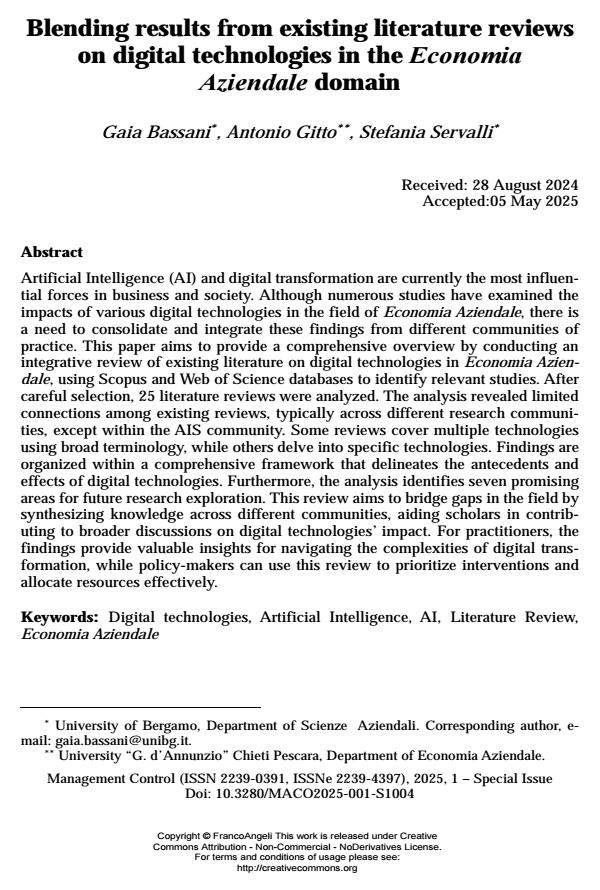Blending results from existing literature reviews on digital technologies in the Economia Aziendale domain
Titolo Rivista MANAGEMENT CONTROL
Autori/Curatori Gaia Bassani, Antonio Gitto, Stefania Servalli
Anno di pubblicazione 2025 Fascicolo 2025/1 Suppl.
Lingua Inglese Numero pagine 27 P. 65-91 Dimensione file 215 KB
DOI 10.3280/MACO2025-001-S1004
Il DOI è il codice a barre della proprietà intellettuale: per saperne di più
clicca qui

FrancoAngeli è membro della Publishers International Linking Association, Inc (PILA), associazione indipendente e non profit per facilitare (attraverso i servizi tecnologici implementati da CrossRef.org) l’accesso degli studiosi ai contenuti digitali nelle pubblicazioni professionali e scientifiche.
Artificial Intelligence (AI) and digital transformation are currently the most influential forces in business and society. Although numerous studies have examined the impacts of various digital technologies in the field of Economia Aziendale, there is a need to consolidate and integrate these findings from different communities of practice. This paper aims to provide a comprehensive overview by conducting an integrative review of existing literature on digital technologies in Economia Aziendale, using Scopus and Web of Science databases to identify relevant studies. After careful selection, 25 literature reviews were analyzed. The analysis revealed limited connections among existing reviews, typically across different research communities, except within the AIS community. Some reviews cover multiple technologies using broad terminology, while others delve into specific technologies. Findings are organized within a comprehensive framework that delineates the antecedents and effects of digital technologies. Furthermore, the analysis identifies seven promising areas for future research exploration. This review aims to bridge gaps in the field by synthesizing knowledge across different communities, aiding scholars in contributing to broader discussions on digital technologies’ impact. For practitioners, the findings provide valuable insights for navigating the complexities of digital transformation, while policy-makers can use this review to prioritize interventions and allocate resources effectively.
Parole chiave:Digital technologies, Artificial Intelligence, AI, Literature Review, Economia Aziendale
Gaia Bassani, Antonio Gitto, Stefania Servalli, Blending results from existing literature reviews on digital technologies in the Economia Aziendale domain in "MANAGEMENT CONTROL" 1 Suppl./2025, pp 65-91, DOI: 10.3280/MACO2025-001-S1004